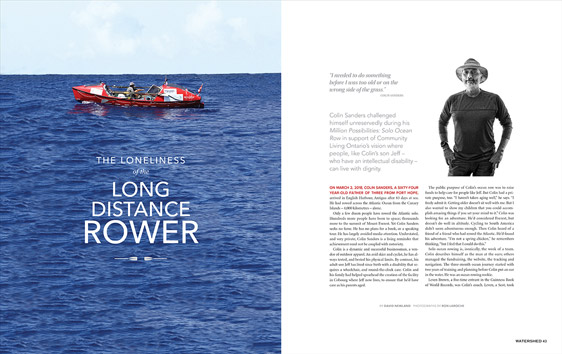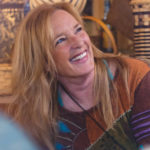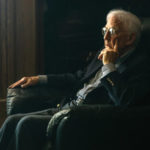
“I needed to do something before I was too old or on the wrong side of the grass.”
Colin Sanders
Colin Sanders challenged himself unreservedly during his Million Possibilities: Solo Ocean Row in support of Community Living Ontario’s vision where people, like Colin’s son Jeff – who have an intellectual disability – can live with dignity.
ON MARCH 2, 2018, COLIN SANDERS, A SIXTY-FOUR YEAR-OLD FATHER OF THREE FROM PORT HOPE, arrived in English Harbour, Antigua after 83 days at sea. He had rowed across the Atlantic Ocean from the Canary Islands – 4,000 kilometres – alone.
Only a few dozen people have rowed the Atlantic solo. Hundreds more people have been to space; thousands more to the summit of Mount Everest. Yet Colin Sanders seeks no fame. He has no plans for a book, or a speaking tour. He has largely avoided media attention. Understated, and very private, Colin Sanders is a living reminder that achievement need not be coupled with notoriety.
Colin is a dynamic and successful businessman, a vendor of outdoor apparel. An avid skier and cyclist, he has always tested, and bested his physical limits. By contrast, his adult son Jeff has lived since birth with a disability that requires a wheelchair, and round-the-clock care. Colin and his family had helped spearhead the creation of the facility in Cobourg where Jeff now lives, to ensure that he’d have care as his parents aged.
The public purpose of Colin’s ocean row was to raise funds to help care for people like Jeff. But Colin had a private purpose, too. “I haven’t taken aging well,” he says. “I freely admit it. Getting older doesn’t sit well with me. But I also wanted to show my children that you could accomplish amazing things if you set your mind to it.” Colin was looking for an adventure. He’d considered Everest, but doesn’t do well in altitude. Cycling to South America didn’t seem adventurous enough. Then Colin heard of a friend of a friend who had rowed the Atlantic. He’d found his adventure. “I’m not a spring chicken,” he remembers thinking, “but I feel that I could do this.”
Solo ocean rowing is, ironically, the work of a team. Colin describes himself as the man at the oars; others managed the fundraising, the website, the tracking and navigation. The three-month ocean journey started with two years of training and planning before Colin put an oar in the water. He was an ocean rowing rookie.
Leven Brown, a five-time entrant in the Guinness Book of World Records, was Colin’s coach. Leven, a Scot, took Colin out on the North Sea in November, to get the feel of the boat. He also introduced Colin to ‘the philosophy of rowing’. “It’s a metaphor for a lot of big tasks where you can say one step at a time, one stroke at a time, and take the rough with the smooth. The original definition of stoicism is not worrying about risk that’s beyond your control, but managing everything else and controlling it.”
Leven’s experience was critical in the area of management and control: knowing what to pack, how to execute tasks aboard, and especially, how to deal with challenges as they arose. But nothing could prepare Colin for what it’s actually like to be at sea for twelve weeks alone. The simple fact of moisture, for example: “Not once in all of the prep I did, did I ever once consider the fact that I would be soaked for weeks on end,” says Colin. “That was difficult to accept. Not only wet on deck but inside the cabin the condensation was just dripping off the ceiling.” There were other unforeseen discomforts: a laptop loaded with hundreds of movies fizzled in the salty moisture, leaving Colin with just a few films on an iPad to pass the time. “If you want to know anything about The Godfather,” he says dryly, “I can tell you because I’ve watched it about 50 times.” Worse, his Spotify account locked him out after four weeks at sea, terminating access to the thousands of songs he had depended on to keep him rowing through the tough times.
And there were tough times. Colin used a desalinator powered by solar panels for fresh water. When the solar panels burned out, his backup was a hand pump that would have cost him hours of precious rowing progress daily. Luckily, Leven talked him through a repair by satellite phone. But Colin was basically learning to row on the Atlantic Ocean by himself. The monotony of camp-style cuisine, the physical grind of days at the oars, the discomfort of a wet, cluttered cabin can all combine to wear down the strongest and most experienced solo ocean rower. Colin, at 64, was neither.
Veteran ocean rower John Beeden had sold Colin his ocean rowboat, Socks II. With a skin of Kevlar over closed-cell foam, and a fiberglass interior, this custom-built craft is literally unsinkable. “If Socks were to break in two, both halves would float,” says Beeden, another record-holding British rower. The boat’s cheery name underlines a useful mantra: “Pull your socks up and get on with it.” John explains, “The thing about ocean rowing is that once you’re at sea there is no going back. You need to get to somewhere, and you can be 1,500, 2,000 miles away from the nearest land.”
Socks II may be unsinkable, but Colin Sanders is not. Early on in the journey, a wave stood the boat on end, tossing Colin from the boat into the sea. Luckily, he was wearing a tether, and managed to scramble back in. Ocean currents can separate a rower from his boat in seconds – forever. On New Year’s Eve, caught between high waves, the boat flipped with Colin in the cabin; all he could do was tuck his head in and try to cushion the blows.
Hundreds of miles out to sea, waves would crash onto the boat as he rowed, leaving 500 gallons of water Colin would have to bail out. He broke an oar. His fingers ached. He couldn’t replace the calories he expended daily. Like many adventurers, Colin chronicled his travails in a journal – a blog at www.onemillionpossibilities.com, updated by text message over his satellite phone. Early on, his blog entries described the pitfalls, as well as items of interest – various whales, for example, or a bulk carrier in the distance. As the journey lengthened, the updates shortened. Colin hoped he was half-way done by Day 35. On Day 52 he began his entry with “It’s 12:30 pm and I am in hell.”
By Day 65, his dwindling strength had been further drained by food poisoning. Then he slipped and fell on deck. He self-assessed cracked ribs, took morphine to manage the pain – and resumed his rhythm at the oars. Two and a half weeks from Antigua, what else could he do? There are no blog entries between Day 65 and Day 75.
Colin maintained Greenwich Mean Time through out his voyage. It was his way of scheduling around a daily ritual: talking to Stokey Woodall from England on the satellite phone. Stokey, whose 300,000 sea miles have included 30 Atlantic crossings by sail, was Colin’s navigator and weather router. Stokey helped Colin make the most of conditions, but even so, on some days, he barely made forward progress. Combined with injury, inconvenience, and discomfort, that’s a recipe for despair. Stokey – literally, a voice from the heavens over the satellite phone – was Colin’s lifeline. “Hey mate, no one said this was going to be f**kin’ easy,” is one of Stokey’s gems. Tough love is part of the psychology of ocean rowing. “During the first week you think that you’re going to die. But then you realize, it becomes normal. And you’ll be in far worse conditions later in the trip. Your bad days early on become your good days,” says Stokey.
Consider Colin’s daily schedule, on the good days: “I’d get up in the morning; I’d make breakfast, which was always oatmeal with some kind of concoction on the top of it. So I probably had about 1,500 to 2,000 calories in one go. I’d clean up; if it was bad weather, which was often, I’d put my foul weather gear on. And then I’d get out on deck, and I’d clear the flying fish off the deck, and I’d take a mitt full of protein or some sort of energy bar with me to my rowing seat. And I’d get my gloves on and I would start rowing.”
Colin Sanders maintained that schedule through 83 days, 10 to 12 hours daily, all the way from Canary Islands to Antigua. His weight and strength slipped; his spirits often sagged. He questioned his decision to make the row. And even with modern technology, solitude was a factor. With characteristic understatement, he describes the loneliness of the long-distance rower. “I didn’t really use the phone too much. I emailed my kids at New Year’s. We didn’t really talk too much, too expensive. Mostly text.” His blog hinted at the true depth of the challenges – but every entry ended with the same word: “Onward.”
Colin’s updates became water cooler talk for folks at Community Living Ontario, the umbrella organization that funnels provincial funds to organizations like the one where Jeff Sanders is housed. They’d thrown their lot in with Colin despite initial misgivings. Chris Beesley, the organization’s CEO, had first heard of Colin when he proposed the trip, out of the blue. “Of course we were thinking, he’s not a young guy, and that sounds like a pretty epic trip that he might not survive!” says Chris. “But the more time you spend with him, the more you realize he’s serious, and he says he’s always wanted this kind of epic adventure in his life, but he wants it to count for more.”
Colin’s efforts did count for more. His journey helped raise over $150,000 for Community Living Ontario, and inspired local affiliates across the province to raise additional funds through their own local efforts inspired by Colin’s journey.
Ron Laroche, Community Living Ontario’s Director of Communications, Marketing and Fund Development was among the small contingent of well-wishers who gave Colin ‘a hero’s welcome’ as he finally rowed into English Harbour, Antigua. Ron could tell the journey had taken its toll. “He had been up since roughly three in the morning and rowing ‘til between five and six that evening. He was pretty tired. He had been out 83 days on the ocean. He had a little bit of trouble getting onto the dock and needed support to get his land legs back. It felt like the dock was moving. He was very glad to be back on land.” For his part, Colin says, “I was grateful for the small things. Lying in dry sheets. Nice to be able to eat a tomato.”
John Beeden was there, too, to “take advantage of him while he was in a weakened state and buy the boat back.” Colin made no objection. Among the greeters was a rower who had just crossed the Atlantic as a member of a four-man team. They had done the trip in 29 days. “Big difference when you’re on your own,” says Colin. “They’re at it 24/7, two hours on, two hours off; there are two guys rowing at all times – young strapping guys. That ain’t me.”
But that’s just what makes Colin’s achievement memorable “It’s the old horse for the hard road,” says coach Leven Brown. “What makes a person live or die, succeed or fail is their ability to see through the hard times.”
“I know that Colin won’t blow his own trumpet. His neighbours won’t take anything away from it because they probably won’t know. But one day they’ll find out that he rowed the ocean alone on a voyage of self-discovery, and raised a lot of money for a great cause: the foundation that supports his son. We’re dealing with an exceptional man who’s done an exceptional thing. If that’s not an inspiration, I don’t know what is.”
Story by:
David Newland
Photography by:
Ron Laroche


